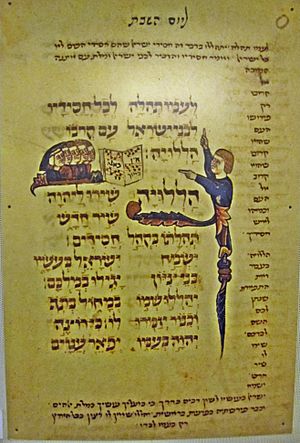Hallelujah facts for kids
Hallelujah (/ˌhælɪˈluːjə/ HAL-i-LOO-yə; Hebrew: הַלְלוּ-יָהּ haləlū-Yāh) is an interjection used as an expression of gratitude and adoration. The term is used 24 times in the Hebrew Bible (in the book of Psalms), twice in deuterocanonical books, and four times in the Christian Book of Revelation.
The phrase is used in Judaism as part of the Hallel prayers, and in Christian prayer, where since the earliest times it is used in various ways in liturgies, especially those of the Catholic Church and the Eastern Orthodox Church, both of which use the form "alleluia" which is based on the alternative Greek transliteration.
Contents
Etymology
Hallelujah is a transliteration of the Hebrew phrase הַלְלוּ יָהּ (halelū yāh), which means "praise ye Jah!" (from הַלְלוּ, "praise ye!" and יָהּ, "Jah".) The word hallel in Hebrew means a joyous praise in song. The second part, Yah, is a shortened form of YHWH (Yahweh or Jehovah in modern English).
In the Bible
הַלְלוּיָהּ is found in 24 verses in the Book of Psalms (104–106, 111–117, 135, 145–150), but twice in Psalm 150:6. It starts and concludes a number of Psalms.
The Greek transliteration ἀλληλούϊα (allēlouia) appears in the Septuagint version of these Psalms, in Tobit 13:17 and 3 Maccabees 7:13, and four times in Revelation 19:1–6, the great song of praise to God. It is this usage that Charles Jennens extracted for the Hallelujah Chorus in Handel's Messiah. This transliteration is the basis of the alternative English transliteration "Alleluia" that is also used by Christians.
Usage by Jews
The word "hallelujah" is sung as part of the Hallel Psalms (interspersed between Psalms 113–150). In Tractate Shabbat of the Talmud, Rabbi Yose is quoted as saying that the Pesukei dezimra Psalms should be recited daily. Psalms 145–150, also known as the Hallel of pesukei dezimra, are included to fulfill this requirement in the liturgy for the traditional Jewish Shacharit (morning) service. In addition, on the three Pilgrimage Festivals, the new moon and Hanukkah, Psalms 113-118 are recited. The latter psalms are known simply as Hallel with no additional qualification.
Psalms 146:10, ending with Halleluja, is the third and final biblical quotation in the Kedushah. This expanded version of the third blessing in the Amidah is said during the Shacharit and Mincha (morning and afternoon) services when there is a minyan present.
Usage by Christians
For most Christians, "Hallelujah" is considered a joyful word of praise to God, rather than an injunction to praise him. "The Alleluia" refers to a traditional chant, combining the word with verses from the Psalms or other scripture. In the Latin Rite of the Catholic Church, and in many older Protestant denominations, the Alleluia, along with the Gloria in excelsis Deo, is not spoken or sung in liturgy during the season of Lent, instead being replaced by a Lenten acclamation, while in Eastern Churches, Alleluia is chanted throughout Lent at the beginning of the Matins service, replacing the Theos Kyrios, which is considered more joyful. At the Easter service and throughout the Pentecostarion, Christos anesti is used in the place where Hallelujah is chanted in the western rite expressing happiness.
In contemporary worship among many Protestants, expressions of "Hallelujah" and "Praise the Lord" are acceptable spontaneous expressions of joy, thanksgiving and praise towards God, requiring no specific prompting or call or direction from those leading times of praise and singing.
In popular culture
In modern English, "Hallelujah" is frequently spoken to express happiness that a thing hoped or waited for has happened. An example is its use in the song "Get Happy".
Leonard Cohen's 1984 song "Hallelujah" was initially rejected by Columbia Records for lacking commercial appeal, was popularized through covers by John Cale (1991) and Jeff Buckley (1994), achieved "modern ubiquity" after its inclusion in the animated movie Shrek (2001), and reached the Billboard charts upon Cohen's death in 2016.
In Medicine
The name Hallelujah often appears in titles of academic medical papers. In one such paper the author discusses how a patient suffers from steroid psychosis and starts shouting hallelujah after rushing out in the hallway.
See also
 In Spanish: Aleluya para niños
In Spanish: Aleluya para niños


